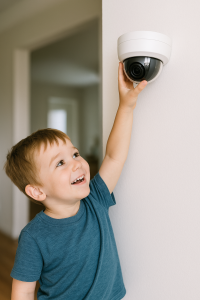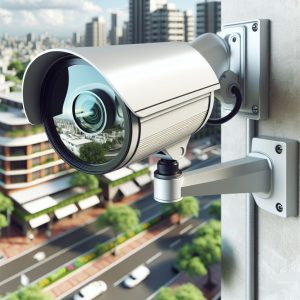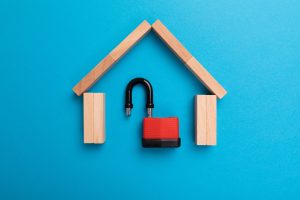Selecting the right alarm sensors for your home is crucial for ensuring the safety and security of your property and loved ones. With a variety of sensors available, understanding their functions and how they fit into your overall security system can help you make an informed decision. This comprehensive guide will walk you through the different types of alarm sensors, their features, and how to choose the best ones for your home.
Understanding Alarm Sensors
Alarm sensors are devices designed to detect changes in the environment and trigger an alarm when specific conditions are met. They are integral components of home security systems, providing the first line of defense against intrusions, fires, and other emergencies. Here are the main types of alarm sensors:
- Door and Window Sensors
- Function: Detect when doors or windows are opened.
- Types: Magnetic sensors, contact sensors.
- Placement: Installed on the frames of doors and windows.
- Benefits: Simple installation, immediate alerts for unauthorized entry.
- Motion Detectors
- Function: Sense movement within a designated area.
- Types: Passive infrared (PIR) sensors, microwave sensors, dual-technology sensors.
- Placement: Commonly placed in high-traffic areas, hallways, and near entry points.
- Benefits: Effective for large areas, can be pet-friendly to avoid false alarms.
- Glass Break Sensors
- Function: Detect the sound of breaking glass.
- Types: Acoustic sensors, shock sensors.
- Placement: Near windows and glass doors.
- Benefits: Provide additional security for glass entry points, reduce false alarms from other noises.
- Smoke and Fire Detectors
- Function: Alert to the presence of smoke or fire.
- Types: Ionization smoke detectors, photoelectric smoke detectors, dual-sensor smoke detectors.
- Placement: On ceilings or high on walls, especially in kitchens, hallways, and near bedrooms.
- Benefits: Early detection of fires, essential for safety and compliance with building codes.
- Carbon Monoxide Detectors
- Function: Detect dangerous levels of carbon monoxide gas.
- Types: Electrochemical sensors, biomimetic sensors, metal oxide semiconductor sensors.
- Placement: Near sleeping areas and fuel-burning appliances.
- Benefits: Critical for preventing carbon monoxide poisoning, especially in homes with gas appliances.
- Flood and Water Leak Sensors
- Function: Detect the presence of water or moisture.
- Types: Point sensors, area sensors.
- Placement: In basements, near water heaters, under sinks, and around appliances prone to leaks.
- Benefits: Prevent water damage, alert homeowners to potential flooding.
Evaluating Your Home Security Needs
Before selecting alarm sensors, it’s important to evaluate your specific security needs. Consider the following factors:
- Home Layout and Size
- Larger homes or those with complex layouts may require more sensors to cover all entry points and vulnerable areas.
- Location and Crime Rate
- Homes in areas with higher crime rates may benefit from more advanced security solutions, including additional sensors and monitoring services.
- Family Lifestyle
- Consider the daily routines and habits of family members. Systems should provide security without impeding daily activities.
- Valuables and High-Risk Areas
- If you have high-value items, such as art or jewelry, you might need enhanced security features like motion detectors and smart locks.
- Pets
- Pet-friendly sensors are necessary to prevent false alarms caused by pets.
Types of Home Alarm Systems
Home alarm systems come in various forms, each with distinct features to cater to different security requirements:
- Wired Alarm Systems
- Reliability: Less prone to interference, ensuring stable performance.
- Installation: Often involves drilling walls and running cables, which may require professional installation.
- Maintenance: Generally low maintenance once installed, but relocating components can be difficult.
- Wireless Alarm Systems
- Ease of Installation: DIY-friendly with minimal disruption to the home environment.
- Flexibility: Easier to expand and modify, making them suitable for renters or frequent movers.
- Battery Dependence: Require regular battery changes to maintain functionality.
- Monitored Alarm Systems
- 24/7 Monitoring: Round-the-clock monitoring ensures that authorities are notified quickly in case of an emergency.
- Service Fees: Often require a monthly subscription to maintain the monitoring service.
- False Alarms: Can result in fees or penalties if too many false alarms occur.
- Unmonitored Alarm Systems
- Cost-Effective: No ongoing monitoring fees make them more affordable over the long term.
- Self-Reliance: Homeowners are solely responsible for responding to alerts, which can be a drawback during vacations or absences.
- Deter Potential Intruders: The noise generated by the alarm may deter criminals from proceeding.
- Smart Alarm Systems
- Remote Access: Control and monitor the system from anywhere using a mobile app.
- Integration: Can be integrated with other smart home devices like lights, cameras, and thermostats.
- Customization: Offers personalized settings and automation routines to suit individual needs.
Choosing the Right Alarm System Based on Your Budget
When selecting a home alarm system, it is crucial to consider your budget. Understanding that home security is an investment, different systems and their features come at various price points to fit diverse financial plans. Factors such as the complexity of the system, additional gadgets, and subscription fees all contribute to the overall cost.
- Basic Systems
- Cost: Typically lower, suitable for small homes or apartments.
- Features: Basic sensors, limited customization, DIY installation.
- Mid-Range Systems
- Cost: Moderate, offering a balance between affordability and advanced features.
- Features: Enhanced sensors, some smart home integration, professional monitoring options.
- High-End Systems
- Cost: Higher, ideal for larger homes or those requiring comprehensive security.
- Features: Advanced sensors, full smart home integration, professional installation and monitoring.
Conclusion
Choosing the right alarm sensors for your home involves understanding the different types of sensors available, evaluating your specific security needs, and considering your budget. By taking these factors into account, you can select a home alarm system that provides optimal protection for your property and peace of mind for you and your family





